Business Law Assignment: Contract Formation and Elements
VerifiedAdded on 2023/06/15
|10
|2619
|339
AI Summary
This Business Law Assignment discusses the formation of a contract and the elements required for its validity. It also analyzes two case studies to apply the rules of contract formation.
Contribute Materials
Your contribution can guide someone’s learning journey. Share your
documents today.
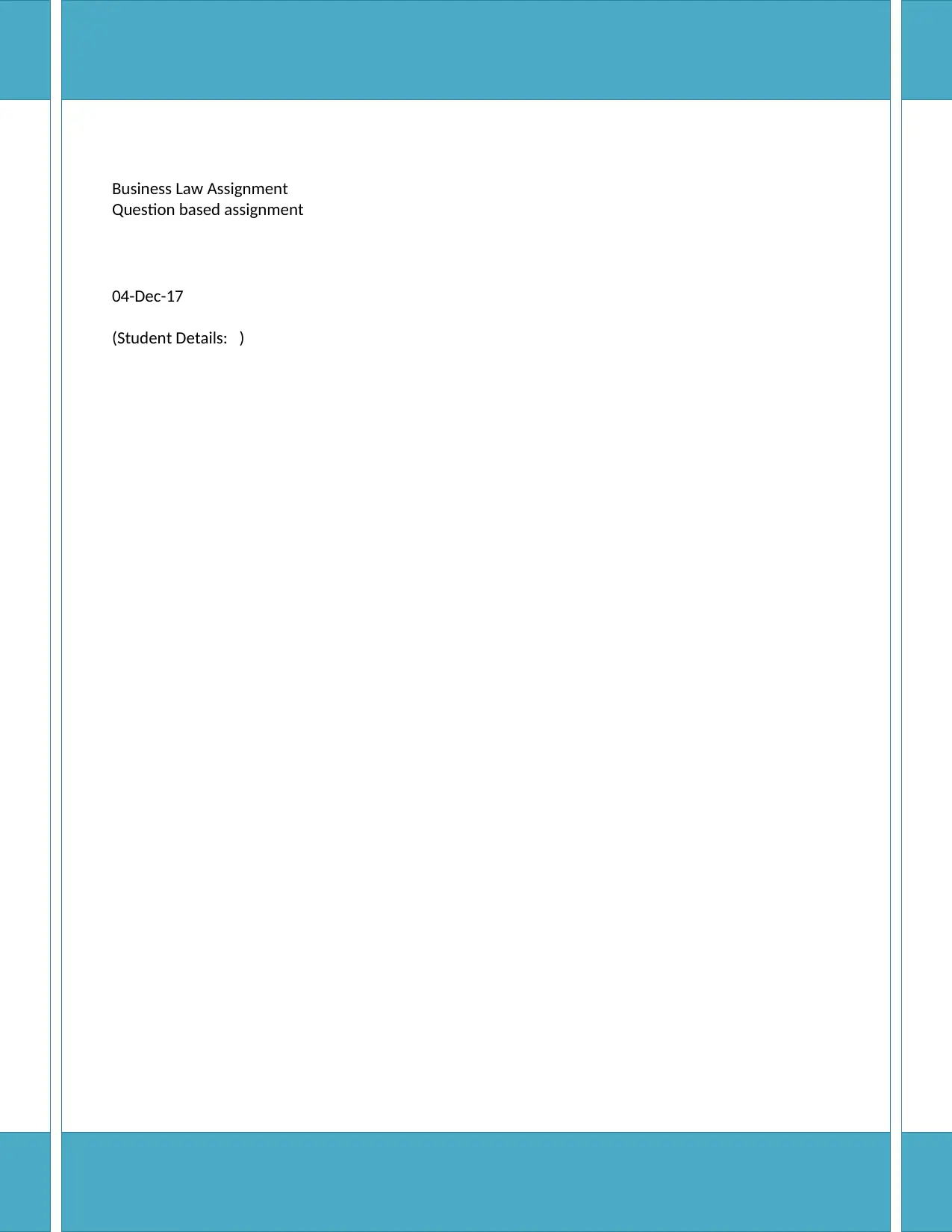
Business Law Assignment
Question based assignment
04-Dec-17
(Student Details: )
Question based assignment
04-Dec-17
(Student Details: )
Secure Best Marks with AI Grader
Need help grading? Try our AI Grader for instant feedback on your assignments.
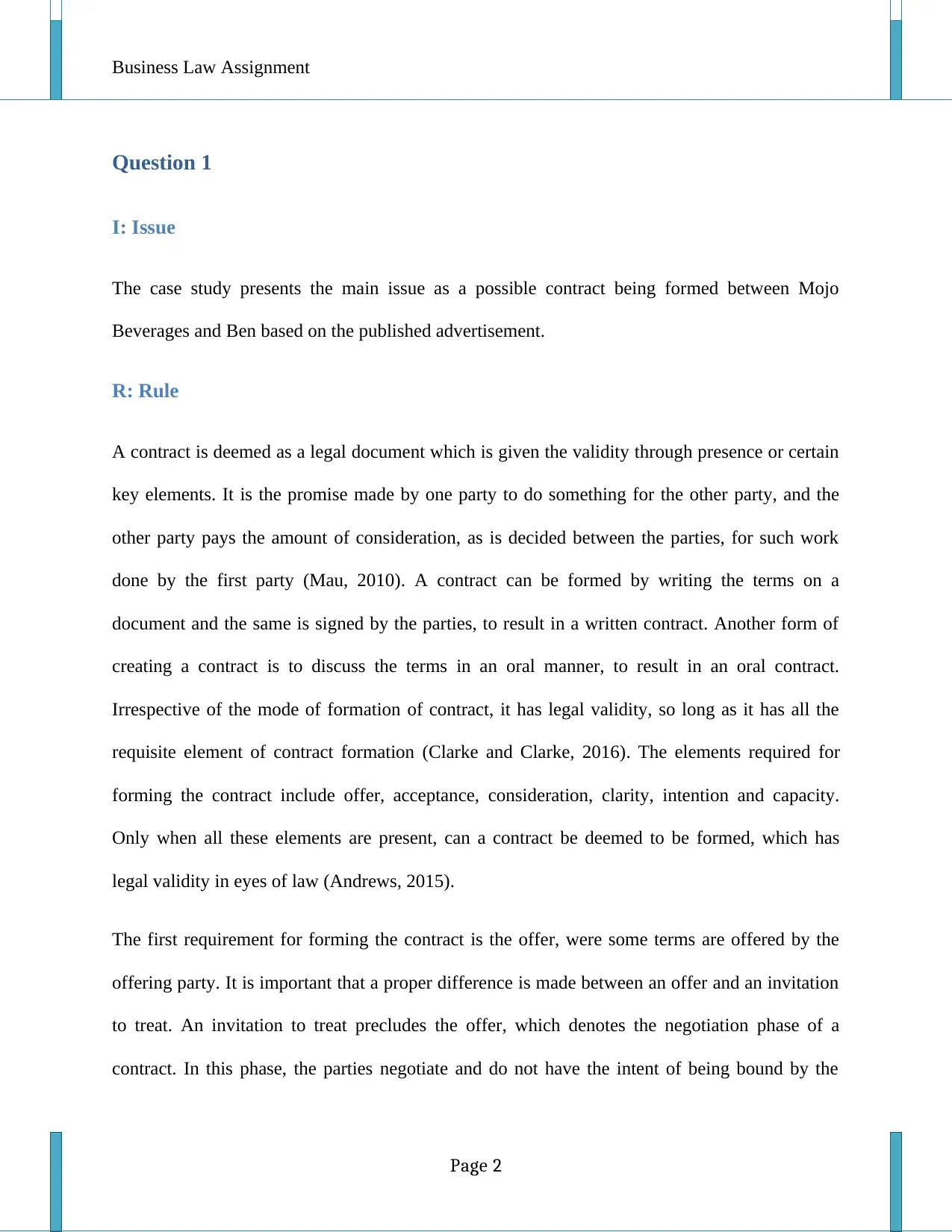
Business Law Assignment
Question 1
I: Issue
The case study presents the main issue as a possible contract being formed between Mojo
Beverages and Ben based on the published advertisement.
R: Rule
A contract is deemed as a legal document which is given the validity through presence or certain
key elements. It is the promise made by one party to do something for the other party, and the
other party pays the amount of consideration, as is decided between the parties, for such work
done by the first party (Mau, 2010). A contract can be formed by writing the terms on a
document and the same is signed by the parties, to result in a written contract. Another form of
creating a contract is to discuss the terms in an oral manner, to result in an oral contract.
Irrespective of the mode of formation of contract, it has legal validity, so long as it has all the
requisite element of contract formation (Clarke and Clarke, 2016). The elements required for
forming the contract include offer, acceptance, consideration, clarity, intention and capacity.
Only when all these elements are present, can a contract be deemed to be formed, which has
legal validity in eyes of law (Andrews, 2015).
The first requirement for forming the contract is the offer, were some terms are offered by the
offering party. It is important that a proper difference is made between an offer and an invitation
to treat. An invitation to treat precludes the offer, which denotes the negotiation phase of a
contract. In this phase, the parties negotiate and do not have the intent of being bound by the
Page 2
Question 1
I: Issue
The case study presents the main issue as a possible contract being formed between Mojo
Beverages and Ben based on the published advertisement.
R: Rule
A contract is deemed as a legal document which is given the validity through presence or certain
key elements. It is the promise made by one party to do something for the other party, and the
other party pays the amount of consideration, as is decided between the parties, for such work
done by the first party (Mau, 2010). A contract can be formed by writing the terms on a
document and the same is signed by the parties, to result in a written contract. Another form of
creating a contract is to discuss the terms in an oral manner, to result in an oral contract.
Irrespective of the mode of formation of contract, it has legal validity, so long as it has all the
requisite element of contract formation (Clarke and Clarke, 2016). The elements required for
forming the contract include offer, acceptance, consideration, clarity, intention and capacity.
Only when all these elements are present, can a contract be deemed to be formed, which has
legal validity in eyes of law (Andrews, 2015).
The first requirement for forming the contract is the offer, were some terms are offered by the
offering party. It is important that a proper difference is made between an offer and an invitation
to treat. An invitation to treat precludes the offer, which denotes the negotiation phase of a
contract. In this phase, the parties negotiate and do not have the intent of being bound by the
Page 2
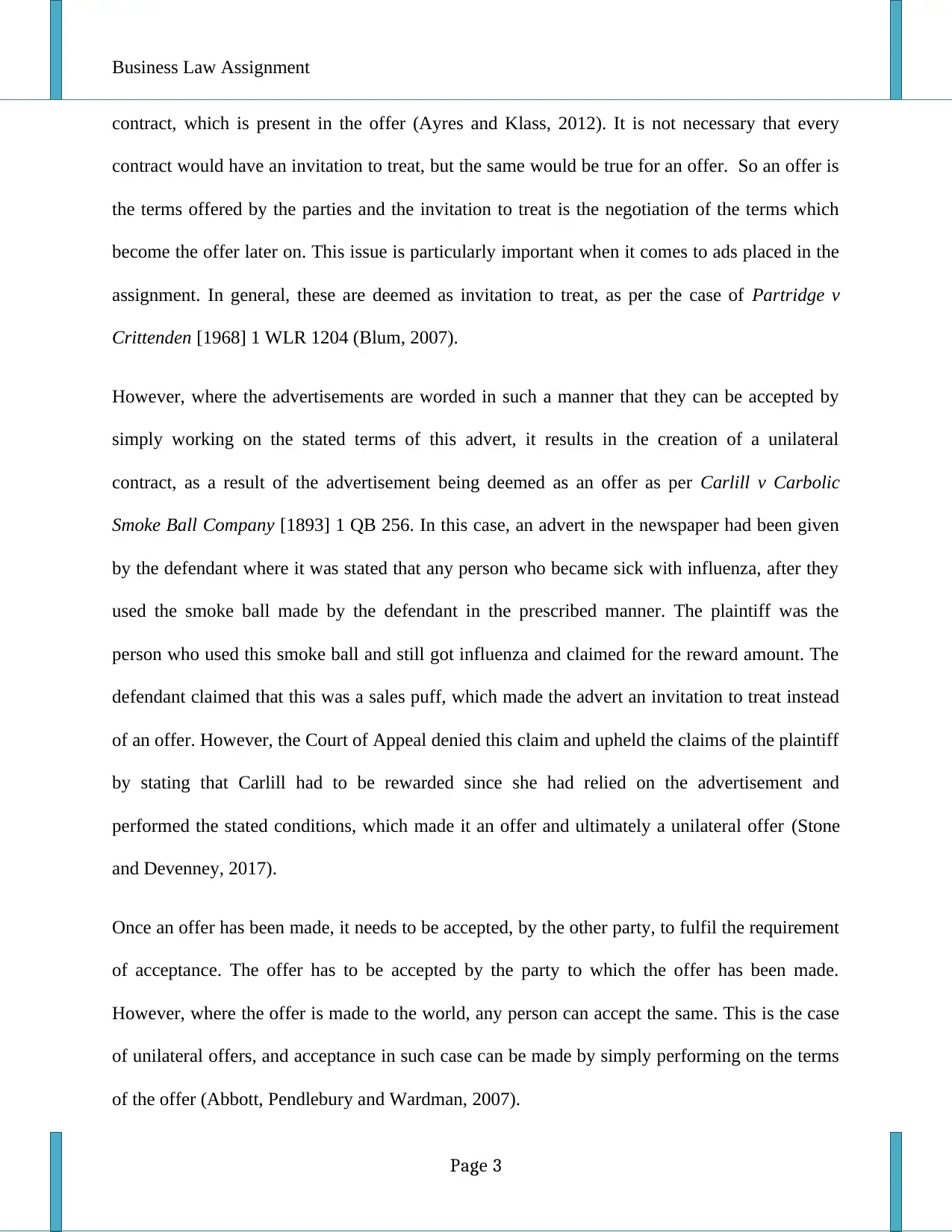
Business Law Assignment
contract, which is present in the offer (Ayres and Klass, 2012). It is not necessary that every
contract would have an invitation to treat, but the same would be true for an offer. So an offer is
the terms offered by the parties and the invitation to treat is the negotiation of the terms which
become the offer later on. This issue is particularly important when it comes to ads placed in the
assignment. In general, these are deemed as invitation to treat, as per the case of Partridge v
Crittenden [1968] 1 WLR 1204 (Blum, 2007).
However, where the advertisements are worded in such a manner that they can be accepted by
simply working on the stated terms of this advert, it results in the creation of a unilateral
contract, as a result of the advertisement being deemed as an offer as per Carlill v Carbolic
Smoke Ball Company [1893] 1 QB 256. In this case, an advert in the newspaper had been given
by the defendant where it was stated that any person who became sick with influenza, after they
used the smoke ball made by the defendant in the prescribed manner. The plaintiff was the
person who used this smoke ball and still got influenza and claimed for the reward amount. The
defendant claimed that this was a sales puff, which made the advert an invitation to treat instead
of an offer. However, the Court of Appeal denied this claim and upheld the claims of the plaintiff
by stating that Carlill had to be rewarded since she had relied on the advertisement and
performed the stated conditions, which made it an offer and ultimately a unilateral offer (Stone
and Devenney, 2017).
Once an offer has been made, it needs to be accepted, by the other party, to fulfil the requirement
of acceptance. The offer has to be accepted by the party to which the offer has been made.
However, where the offer is made to the world, any person can accept the same. This is the case
of unilateral offers, and acceptance in such case can be made by simply performing on the terms
of the offer (Abbott, Pendlebury and Wardman, 2007).
Page 3
contract, which is present in the offer (Ayres and Klass, 2012). It is not necessary that every
contract would have an invitation to treat, but the same would be true for an offer. So an offer is
the terms offered by the parties and the invitation to treat is the negotiation of the terms which
become the offer later on. This issue is particularly important when it comes to ads placed in the
assignment. In general, these are deemed as invitation to treat, as per the case of Partridge v
Crittenden [1968] 1 WLR 1204 (Blum, 2007).
However, where the advertisements are worded in such a manner that they can be accepted by
simply working on the stated terms of this advert, it results in the creation of a unilateral
contract, as a result of the advertisement being deemed as an offer as per Carlill v Carbolic
Smoke Ball Company [1893] 1 QB 256. In this case, an advert in the newspaper had been given
by the defendant where it was stated that any person who became sick with influenza, after they
used the smoke ball made by the defendant in the prescribed manner. The plaintiff was the
person who used this smoke ball and still got influenza and claimed for the reward amount. The
defendant claimed that this was a sales puff, which made the advert an invitation to treat instead
of an offer. However, the Court of Appeal denied this claim and upheld the claims of the plaintiff
by stating that Carlill had to be rewarded since she had relied on the advertisement and
performed the stated conditions, which made it an offer and ultimately a unilateral offer (Stone
and Devenney, 2017).
Once an offer has been made, it needs to be accepted, by the other party, to fulfil the requirement
of acceptance. The offer has to be accepted by the party to which the offer has been made.
However, where the offer is made to the world, any person can accept the same. This is the case
of unilateral offers, and acceptance in such case can be made by simply performing on the terms
of the offer (Abbott, Pendlebury and Wardman, 2007).
Page 3
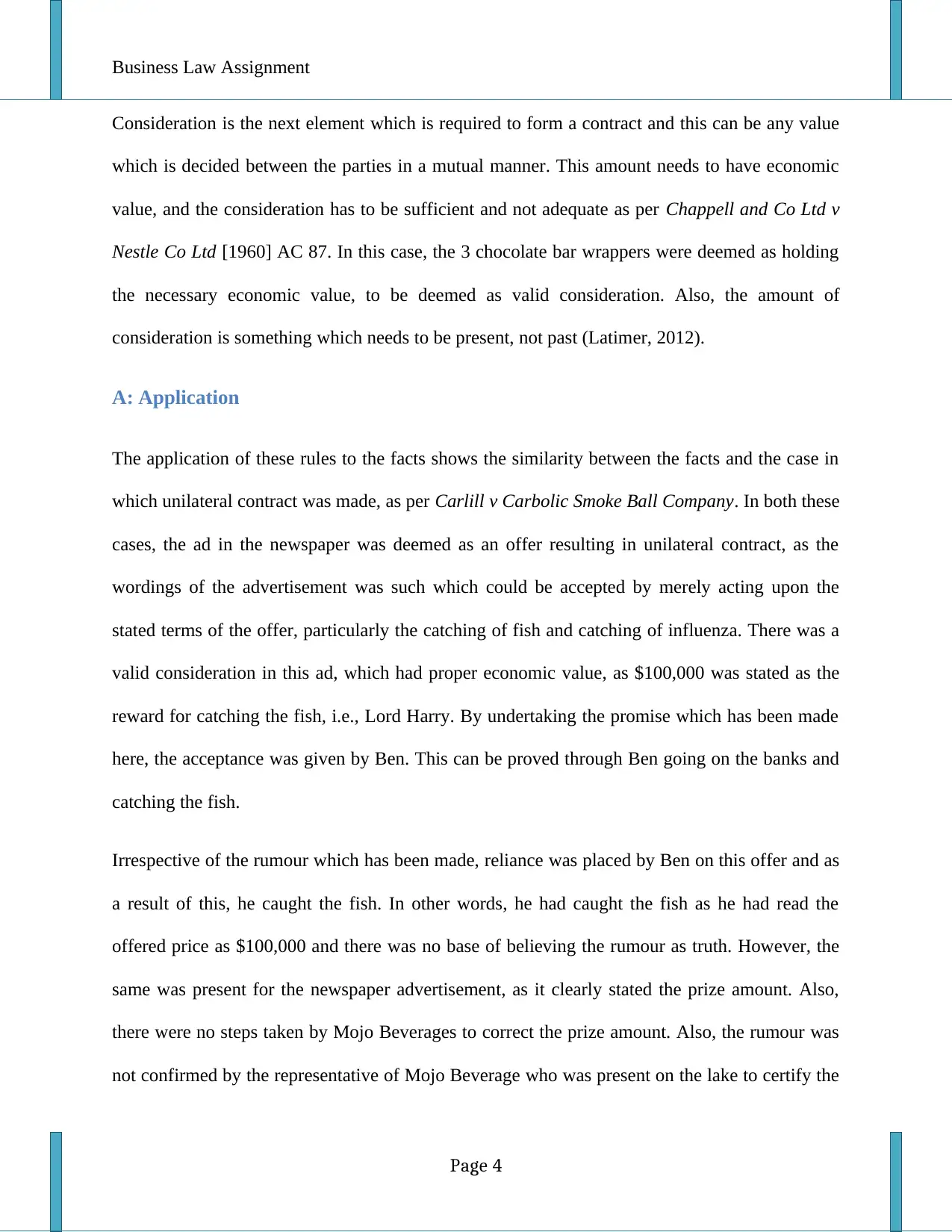
Business Law Assignment
Consideration is the next element which is required to form a contract and this can be any value
which is decided between the parties in a mutual manner. This amount needs to have economic
value, and the consideration has to be sufficient and not adequate as per Chappell and Co Ltd v
Nestle Co Ltd [1960] AC 87. In this case, the 3 chocolate bar wrappers were deemed as holding
the necessary economic value, to be deemed as valid consideration. Also, the amount of
consideration is something which needs to be present, not past (Latimer, 2012).
A: Application
The application of these rules to the facts shows the similarity between the facts and the case in
which unilateral contract was made, as per Carlill v Carbolic Smoke Ball Company. In both these
cases, the ad in the newspaper was deemed as an offer resulting in unilateral contract, as the
wordings of the advertisement was such which could be accepted by merely acting upon the
stated terms of the offer, particularly the catching of fish and catching of influenza. There was a
valid consideration in this ad, which had proper economic value, as $100,000 was stated as the
reward for catching the fish, i.e., Lord Harry. By undertaking the promise which has been made
here, the acceptance was given by Ben. This can be proved through Ben going on the banks and
catching the fish.
Irrespective of the rumour which has been made, reliance was placed by Ben on this offer and as
a result of this, he caught the fish. In other words, he had caught the fish as he had read the
offered price as $100,000 and there was no base of believing the rumour as truth. However, the
same was present for the newspaper advertisement, as it clearly stated the prize amount. Also,
there were no steps taken by Mojo Beverages to correct the prize amount. Also, the rumour was
not confirmed by the representative of Mojo Beverage who was present on the lake to certify the
Page 4
Consideration is the next element which is required to form a contract and this can be any value
which is decided between the parties in a mutual manner. This amount needs to have economic
value, and the consideration has to be sufficient and not adequate as per Chappell and Co Ltd v
Nestle Co Ltd [1960] AC 87. In this case, the 3 chocolate bar wrappers were deemed as holding
the necessary economic value, to be deemed as valid consideration. Also, the amount of
consideration is something which needs to be present, not past (Latimer, 2012).
A: Application
The application of these rules to the facts shows the similarity between the facts and the case in
which unilateral contract was made, as per Carlill v Carbolic Smoke Ball Company. In both these
cases, the ad in the newspaper was deemed as an offer resulting in unilateral contract, as the
wordings of the advertisement was such which could be accepted by merely acting upon the
stated terms of the offer, particularly the catching of fish and catching of influenza. There was a
valid consideration in this ad, which had proper economic value, as $100,000 was stated as the
reward for catching the fish, i.e., Lord Harry. By undertaking the promise which has been made
here, the acceptance was given by Ben. This can be proved through Ben going on the banks and
catching the fish.
Irrespective of the rumour which has been made, reliance was placed by Ben on this offer and as
a result of this, he caught the fish. In other words, he had caught the fish as he had read the
offered price as $100,000 and there was no base of believing the rumour as truth. However, the
same was present for the newspaper advertisement, as it clearly stated the prize amount. Also,
there were no steps taken by Mojo Beverages to correct the prize amount. Also, the rumour was
not confirmed by the representative of Mojo Beverage who was present on the lake to certify the
Page 4
Secure Best Marks with AI Grader
Need help grading? Try our AI Grader for instant feedback on your assignments.
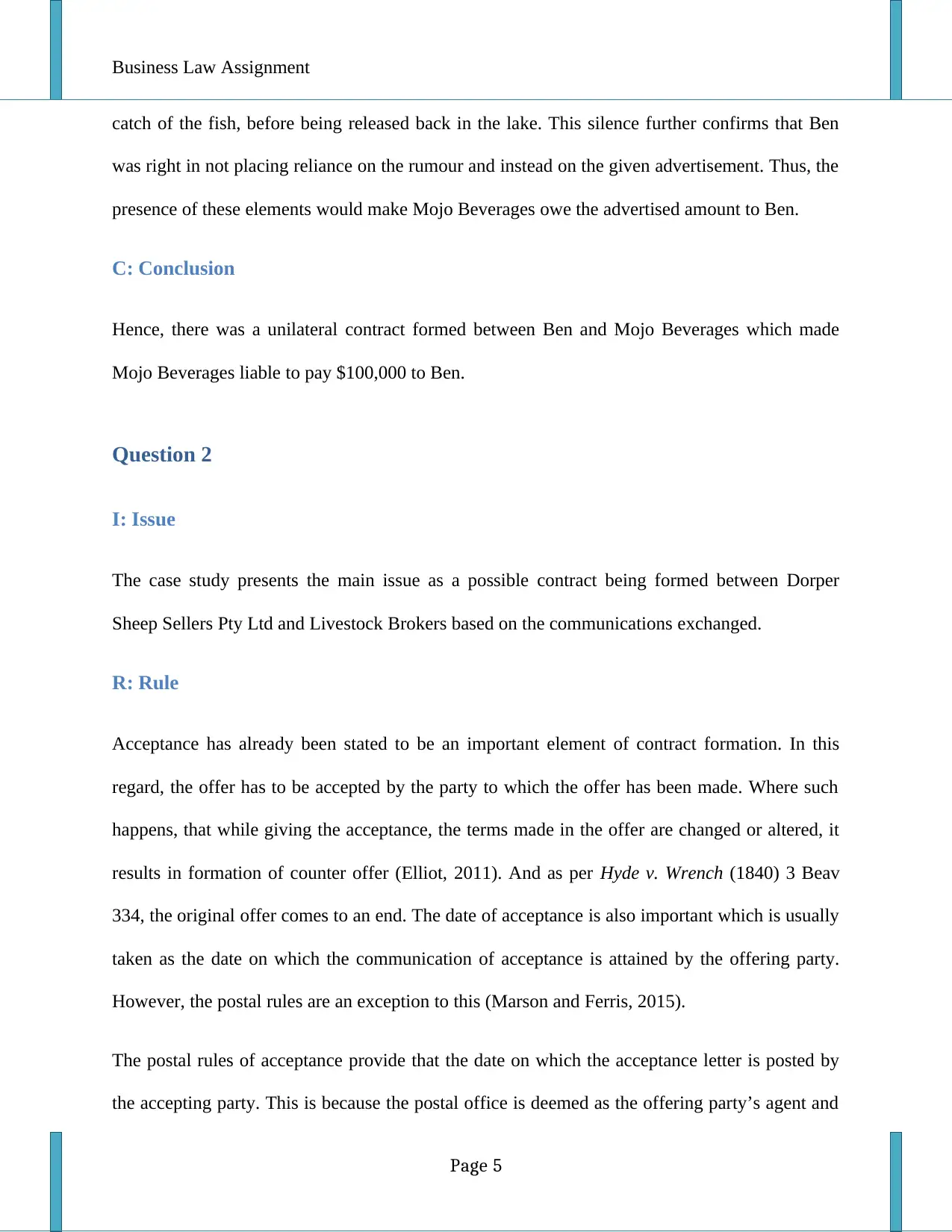
Business Law Assignment
catch of the fish, before being released back in the lake. This silence further confirms that Ben
was right in not placing reliance on the rumour and instead on the given advertisement. Thus, the
presence of these elements would make Mojo Beverages owe the advertised amount to Ben.
C: Conclusion
Hence, there was a unilateral contract formed between Ben and Mojo Beverages which made
Mojo Beverages liable to pay $100,000 to Ben.
Question 2
I: Issue
The case study presents the main issue as a possible contract being formed between Dorper
Sheep Sellers Pty Ltd and Livestock Brokers based on the communications exchanged.
R: Rule
Acceptance has already been stated to be an important element of contract formation. In this
regard, the offer has to be accepted by the party to which the offer has been made. Where such
happens, that while giving the acceptance, the terms made in the offer are changed or altered, it
results in formation of counter offer (Elliot, 2011). And as per Hyde v. Wrench (1840) 3 Beav
334, the original offer comes to an end. The date of acceptance is also important which is usually
taken as the date on which the communication of acceptance is attained by the offering party.
However, the postal rules are an exception to this (Marson and Ferris, 2015).
The postal rules of acceptance provide that the date on which the acceptance letter is posted by
the accepting party. This is because the postal office is deemed as the offering party’s agent and
Page 5
catch of the fish, before being released back in the lake. This silence further confirms that Ben
was right in not placing reliance on the rumour and instead on the given advertisement. Thus, the
presence of these elements would make Mojo Beverages owe the advertised amount to Ben.
C: Conclusion
Hence, there was a unilateral contract formed between Ben and Mojo Beverages which made
Mojo Beverages liable to pay $100,000 to Ben.
Question 2
I: Issue
The case study presents the main issue as a possible contract being formed between Dorper
Sheep Sellers Pty Ltd and Livestock Brokers based on the communications exchanged.
R: Rule
Acceptance has already been stated to be an important element of contract formation. In this
regard, the offer has to be accepted by the party to which the offer has been made. Where such
happens, that while giving the acceptance, the terms made in the offer are changed or altered, it
results in formation of counter offer (Elliot, 2011). And as per Hyde v. Wrench (1840) 3 Beav
334, the original offer comes to an end. The date of acceptance is also important which is usually
taken as the date on which the communication of acceptance is attained by the offering party.
However, the postal rules are an exception to this (Marson and Ferris, 2015).
The postal rules of acceptance provide that the date on which the acceptance letter is posted by
the accepting party. This is because the postal office is deemed as the offering party’s agent and
Page 5
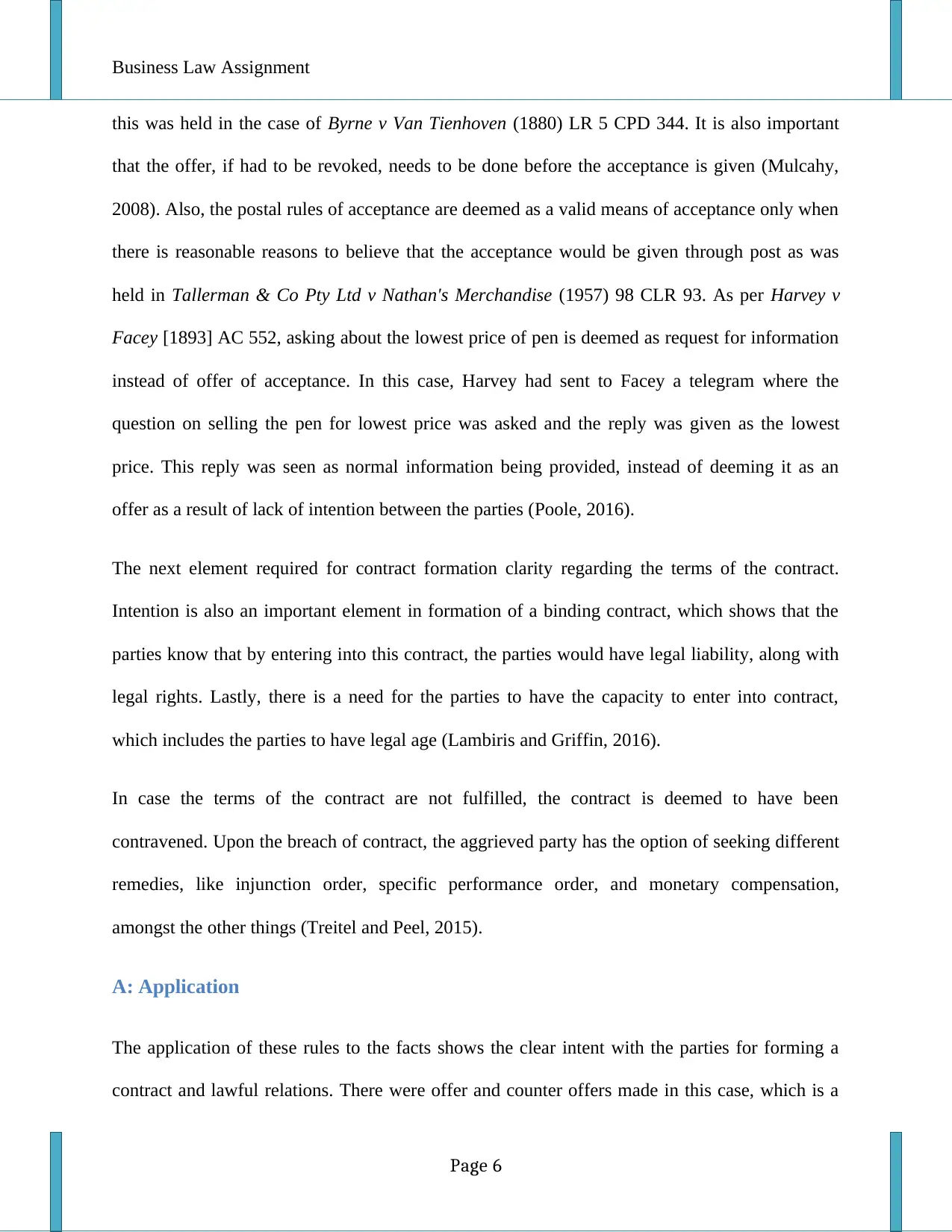
Business Law Assignment
this was held in the case of Byrne v Van Tienhoven (1880) LR 5 CPD 344. It is also important
that the offer, if had to be revoked, needs to be done before the acceptance is given (Mulcahy,
2008). Also, the postal rules of acceptance are deemed as a valid means of acceptance only when
there is reasonable reasons to believe that the acceptance would be given through post as was
held in Tallerman & Co Pty Ltd v Nathan's Merchandise (1957) 98 CLR 93. As per Harvey v
Facey [1893] AC 552, asking about the lowest price of pen is deemed as request for information
instead of offer of acceptance. In this case, Harvey had sent to Facey a telegram where the
question on selling the pen for lowest price was asked and the reply was given as the lowest
price. This reply was seen as normal information being provided, instead of deeming it as an
offer as a result of lack of intention between the parties (Poole, 2016).
The next element required for contract formation clarity regarding the terms of the contract.
Intention is also an important element in formation of a binding contract, which shows that the
parties know that by entering into this contract, the parties would have legal liability, along with
legal rights. Lastly, there is a need for the parties to have the capacity to enter into contract,
which includes the parties to have legal age (Lambiris and Griffin, 2016).
In case the terms of the contract are not fulfilled, the contract is deemed to have been
contravened. Upon the breach of contract, the aggrieved party has the option of seeking different
remedies, like injunction order, specific performance order, and monetary compensation,
amongst the other things (Treitel and Peel, 2015).
A: Application
The application of these rules to the facts shows the clear intent with the parties for forming a
contract and lawful relations. There were offer and counter offers made in this case, which is a
Page 6
this was held in the case of Byrne v Van Tienhoven (1880) LR 5 CPD 344. It is also important
that the offer, if had to be revoked, needs to be done before the acceptance is given (Mulcahy,
2008). Also, the postal rules of acceptance are deemed as a valid means of acceptance only when
there is reasonable reasons to believe that the acceptance would be given through post as was
held in Tallerman & Co Pty Ltd v Nathan's Merchandise (1957) 98 CLR 93. As per Harvey v
Facey [1893] AC 552, asking about the lowest price of pen is deemed as request for information
instead of offer of acceptance. In this case, Harvey had sent to Facey a telegram where the
question on selling the pen for lowest price was asked and the reply was given as the lowest
price. This reply was seen as normal information being provided, instead of deeming it as an
offer as a result of lack of intention between the parties (Poole, 2016).
The next element required for contract formation clarity regarding the terms of the contract.
Intention is also an important element in formation of a binding contract, which shows that the
parties know that by entering into this contract, the parties would have legal liability, along with
legal rights. Lastly, there is a need for the parties to have the capacity to enter into contract,
which includes the parties to have legal age (Lambiris and Griffin, 2016).
In case the terms of the contract are not fulfilled, the contract is deemed to have been
contravened. Upon the breach of contract, the aggrieved party has the option of seeking different
remedies, like injunction order, specific performance order, and monetary compensation,
amongst the other things (Treitel and Peel, 2015).
A: Application
The application of these rules to the facts shows the clear intent with the parties for forming a
contract and lawful relations. There were offer and counter offers made in this case, which is a
Page 6
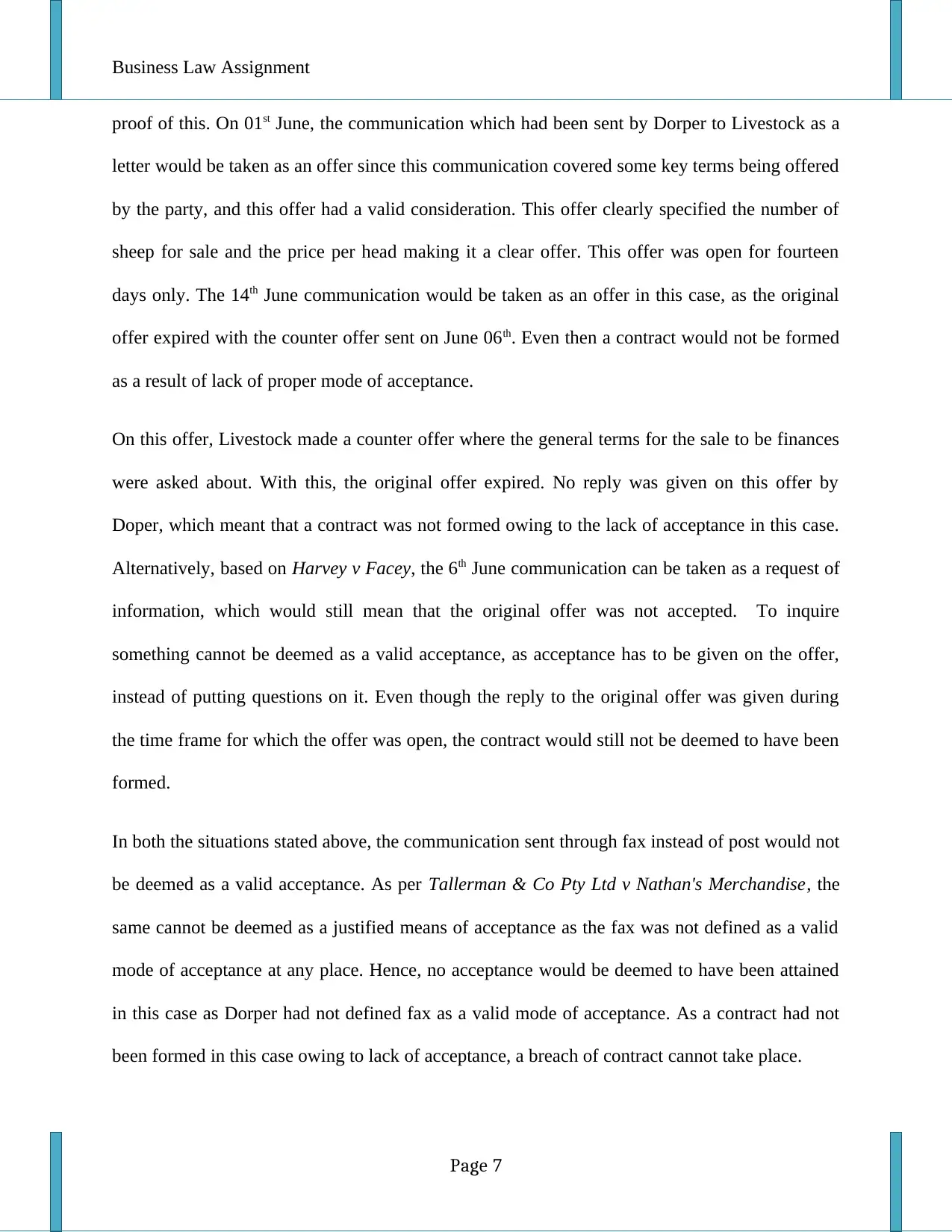
Business Law Assignment
proof of this. On 01st June, the communication which had been sent by Dorper to Livestock as a
letter would be taken as an offer since this communication covered some key terms being offered
by the party, and this offer had a valid consideration. This offer clearly specified the number of
sheep for sale and the price per head making it a clear offer. This offer was open for fourteen
days only. The 14th June communication would be taken as an offer in this case, as the original
offer expired with the counter offer sent on June 06th. Even then a contract would not be formed
as a result of lack of proper mode of acceptance.
On this offer, Livestock made a counter offer where the general terms for the sale to be finances
were asked about. With this, the original offer expired. No reply was given on this offer by
Doper, which meant that a contract was not formed owing to the lack of acceptance in this case.
Alternatively, based on Harvey v Facey, the 6th June communication can be taken as a request of
information, which would still mean that the original offer was not accepted. To inquire
something cannot be deemed as a valid acceptance, as acceptance has to be given on the offer,
instead of putting questions on it. Even though the reply to the original offer was given during
the time frame for which the offer was open, the contract would still not be deemed to have been
formed.
In both the situations stated above, the communication sent through fax instead of post would not
be deemed as a valid acceptance. As per Tallerman & Co Pty Ltd v Nathan's Merchandise, the
same cannot be deemed as a justified means of acceptance as the fax was not defined as a valid
mode of acceptance at any place. Hence, no acceptance would be deemed to have been attained
in this case as Dorper had not defined fax as a valid mode of acceptance. As a contract had not
been formed in this case owing to lack of acceptance, a breach of contract cannot take place.
Page 7
proof of this. On 01st June, the communication which had been sent by Dorper to Livestock as a
letter would be taken as an offer since this communication covered some key terms being offered
by the party, and this offer had a valid consideration. This offer clearly specified the number of
sheep for sale and the price per head making it a clear offer. This offer was open for fourteen
days only. The 14th June communication would be taken as an offer in this case, as the original
offer expired with the counter offer sent on June 06th. Even then a contract would not be formed
as a result of lack of proper mode of acceptance.
On this offer, Livestock made a counter offer where the general terms for the sale to be finances
were asked about. With this, the original offer expired. No reply was given on this offer by
Doper, which meant that a contract was not formed owing to the lack of acceptance in this case.
Alternatively, based on Harvey v Facey, the 6th June communication can be taken as a request of
information, which would still mean that the original offer was not accepted. To inquire
something cannot be deemed as a valid acceptance, as acceptance has to be given on the offer,
instead of putting questions on it. Even though the reply to the original offer was given during
the time frame for which the offer was open, the contract would still not be deemed to have been
formed.
In both the situations stated above, the communication sent through fax instead of post would not
be deemed as a valid acceptance. As per Tallerman & Co Pty Ltd v Nathan's Merchandise, the
same cannot be deemed as a justified means of acceptance as the fax was not defined as a valid
mode of acceptance at any place. Hence, no acceptance would be deemed to have been attained
in this case as Dorper had not defined fax as a valid mode of acceptance. As a contract had not
been formed in this case owing to lack of acceptance, a breach of contract cannot take place.
Page 7
Paraphrase This Document
Need a fresh take? Get an instant paraphrase of this document with our AI Paraphraser
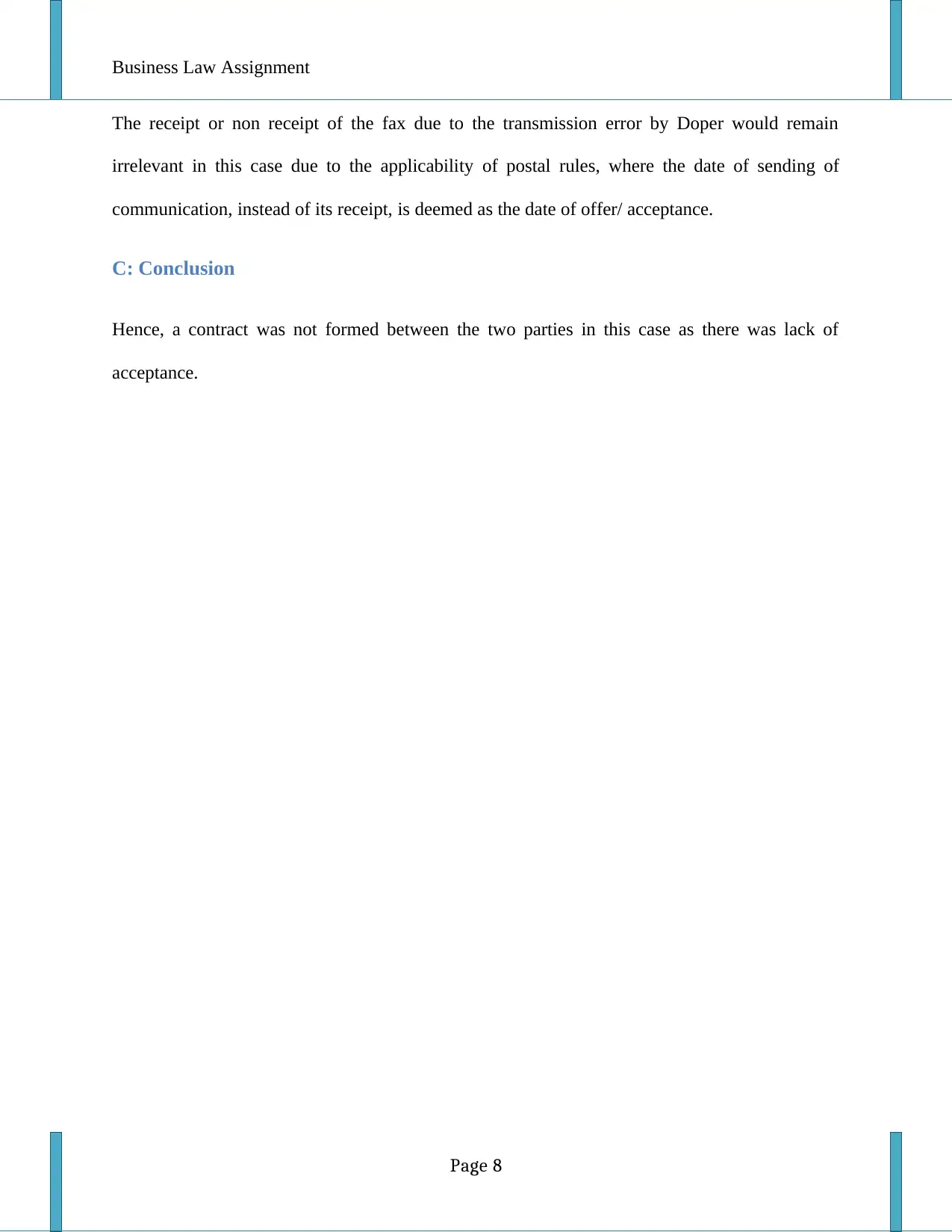
Business Law Assignment
The receipt or non receipt of the fax due to the transmission error by Doper would remain
irrelevant in this case due to the applicability of postal rules, where the date of sending of
communication, instead of its receipt, is deemed as the date of offer/ acceptance.
C: Conclusion
Hence, a contract was not formed between the two parties in this case as there was lack of
acceptance.
Page 8
The receipt or non receipt of the fax due to the transmission error by Doper would remain
irrelevant in this case due to the applicability of postal rules, where the date of sending of
communication, instead of its receipt, is deemed as the date of offer/ acceptance.
C: Conclusion
Hence, a contract was not formed between the two parties in this case as there was lack of
acceptance.
Page 8
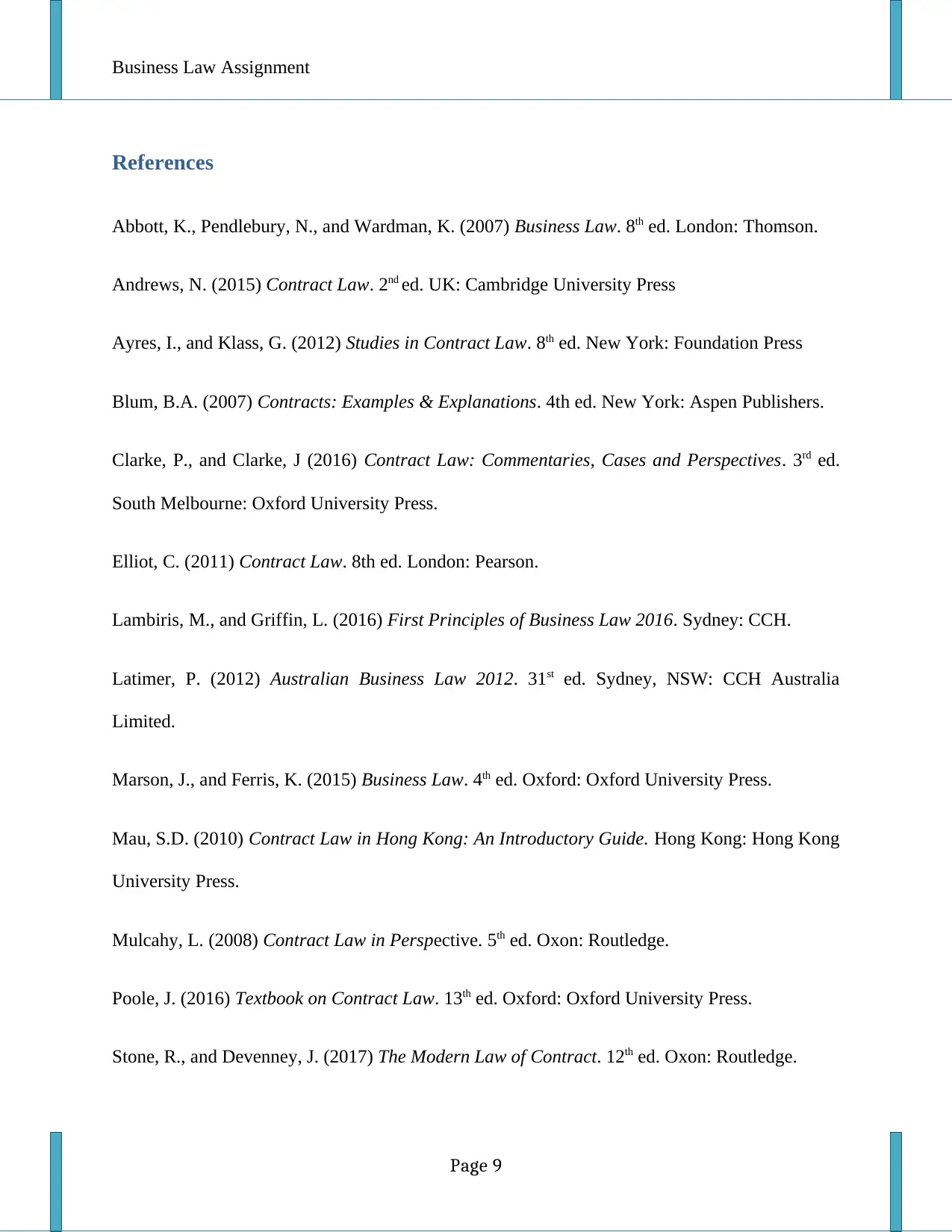
Business Law Assignment
References
Abbott, K., Pendlebury, N., and Wardman, K. (2007) Business Law. 8th ed. London: Thomson.
Andrews, N. (2015) Contract Law. 2nd ed. UK: Cambridge University Press
Ayres, I., and Klass, G. (2012) Studies in Contract Law. 8th ed. New York: Foundation Press
Blum, B.A. (2007) Contracts: Examples & Explanations. 4th ed. New York: Aspen Publishers.
Clarke, P., and Clarke, J (2016) Contract Law: Commentaries, Cases and Perspectives. 3rd ed.
South Melbourne: Oxford University Press.
Elliot, C. (2011) Contract Law. 8th ed. London: Pearson.
Lambiris, M., and Griffin, L. (2016) First Principles of Business Law 2016. Sydney: CCH.
Latimer, P. (2012) Australian Business Law 2012. 31st ed. Sydney, NSW: CCH Australia
Limited.
Marson, J., and Ferris, K. (2015) Business Law. 4th ed. Oxford: Oxford University Press.
Mau, S.D. (2010) Contract Law in Hong Kong: An Introductory Guide. Hong Kong: Hong Kong
University Press.
Mulcahy, L. (2008) Contract Law in Perspective. 5th ed. Oxon: Routledge.
Poole, J. (2016) Textbook on Contract Law. 13th ed. Oxford: Oxford University Press.
Stone, R., and Devenney, J. (2017) The Modern Law of Contract. 12th ed. Oxon: Routledge.
Page 9
References
Abbott, K., Pendlebury, N., and Wardman, K. (2007) Business Law. 8th ed. London: Thomson.
Andrews, N. (2015) Contract Law. 2nd ed. UK: Cambridge University Press
Ayres, I., and Klass, G. (2012) Studies in Contract Law. 8th ed. New York: Foundation Press
Blum, B.A. (2007) Contracts: Examples & Explanations. 4th ed. New York: Aspen Publishers.
Clarke, P., and Clarke, J (2016) Contract Law: Commentaries, Cases and Perspectives. 3rd ed.
South Melbourne: Oxford University Press.
Elliot, C. (2011) Contract Law. 8th ed. London: Pearson.
Lambiris, M., and Griffin, L. (2016) First Principles of Business Law 2016. Sydney: CCH.
Latimer, P. (2012) Australian Business Law 2012. 31st ed. Sydney, NSW: CCH Australia
Limited.
Marson, J., and Ferris, K. (2015) Business Law. 4th ed. Oxford: Oxford University Press.
Mau, S.D. (2010) Contract Law in Hong Kong: An Introductory Guide. Hong Kong: Hong Kong
University Press.
Mulcahy, L. (2008) Contract Law in Perspective. 5th ed. Oxon: Routledge.
Poole, J. (2016) Textbook on Contract Law. 13th ed. Oxford: Oxford University Press.
Stone, R., and Devenney, J. (2017) The Modern Law of Contract. 12th ed. Oxon: Routledge.
Page 9
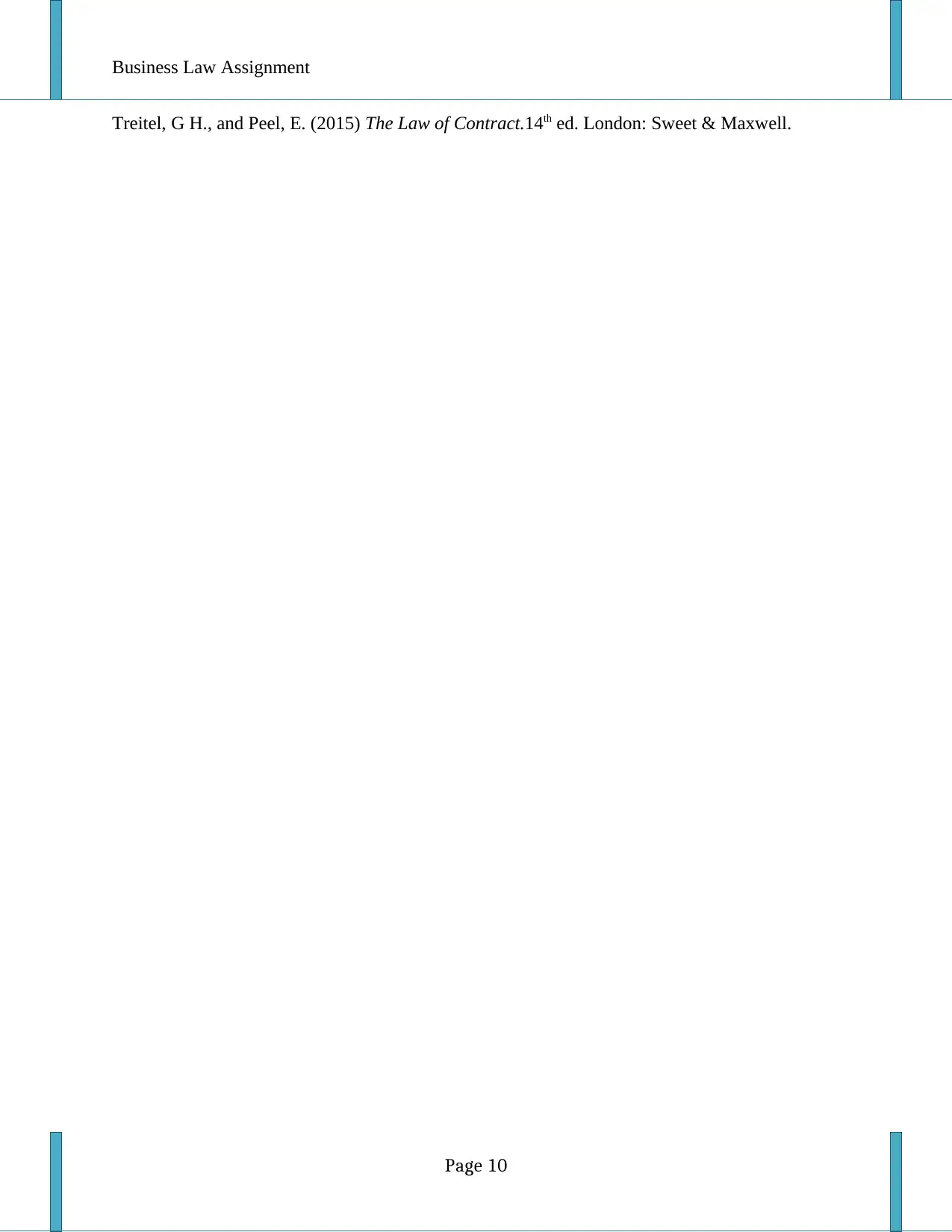
Business Law Assignment
Treitel, G H., and Peel, E. (2015) The Law of Contract.14th ed. London: Sweet & Maxwell.
Page 10
Treitel, G H., and Peel, E. (2015) The Law of Contract.14th ed. London: Sweet & Maxwell.
Page 10
1 out of 10
Related Documents
Your All-in-One AI-Powered Toolkit for Academic Success.
+13062052269
info@desklib.com
Available 24*7 on WhatsApp / Email
![[object Object]](/_next/static/media/star-bottom.7253800d.svg)
Unlock your academic potential
© 2024 | Zucol Services PVT LTD | All rights reserved.





